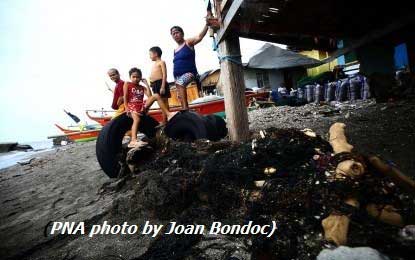MANILA – Fish and shellfish from the coastal waters of Cavite province remain unfit for human consumption, the Bureau of Fisheries and Aquatic Resources (BFAR) said Tuesday.
In a statement, the BFAR said this is based on its on-ground sensory evaluation of fishing areas and communities surrounding Manila Bay in the aftermath of last month’s oil spill in Bataan province.
The clarification was issued amid the call of fishers’ group Pambansang Lakas ng Kilusang Mamamalakaya ng Pilipinas (Pamalakaya) to lift the fishing ban imposed in the eight coastal municipalities of Cavite, saying these were not affected by the oil spill.
In response, BFAR said the “no catch and no-sell zone for all shellfish in the coastal areas of the province of Cavite” based on Executive Order No. 38 issued on July 31 is still in effect.
The BFAR explained that fish samples are regularly collected and analyzed for traces of oil and grease and the presence of harmful contaminants called polycyclic aromatic hydrocarbons (PAH) since the sinking of MTKR Terranova and MTKR Jason Bradley on July 25 and July 27, respectively, and the grounding of the MV Mirola 1 on July 31 in the waters off Bataan.
“These tests are important to ensure that fish caught in the potentially affected areas are free from contamination and safe for public consumption,” the agency added.
Moreover, all fishing activities within the four-kilometer radius of the location of MTKR Terranova in Bataan, particularly Limay, and Barangay Cabcaben in Mariveles remained prohibited, based on Executive Order 32 issued on Aug. 1
NCR, Central Luzon waters safe
Meanwhile, shellfish from the coastal waters off Bataan, Bulacan and Pampanga in Central Luzon, as well as Navotas, Manila, Parañaque and Las Piñas in the National Capital Region are free from oil and grease contamination and are fit for human consumption based on analysis from samples submitted between July 29 and Aug. 12, the BFAR added.
Moreover, sensory evaluation of fish samples from Batangas, particularly in Nasugbu, Lian, and Calatagan, conducted on Aug. 9, showed that all samples were negative for traces of oil and grease.
The BFAR said the agency will maintain fish sampling and conduct a sensory evaluation to determine the presence of oil and grease in potentially affected areas and ensure the safety of the consuming public.
The agency encouraged fisherfolk and the public to remain calm and monitor the situation through updates issued by relevant authorities. (PNA)

